Past Murrumbidgee River Expeditions
A selection of other notable Murrumbidgee River expeditions
I was watching the rivers and weather closely now that the borders were all reopened and the la Niña weather cycle should have been sending a lot of rain to all of the east coast. Sadly, QLD was missing out and we were in a green drought. We just got the occasional shower to green everything up but not enough to fill the rivers or dams let alone refill the aquifers. My hopes to finish the Condamine and Darling rivers this summer were fading fast.
Looking at the southern rivers, the Lachlan was in flood and this seemed like a possible opportunity to tackle this rarely attempted river. With no details I dug into the data online and planned a possible trip. The hurdle was the final 100 km that I simply couldn't figure out a way to handle it without support, or at least a way to handle it without having to call on support.
After being warned about difficulties that others had faced in the middle sections I was becoming more cautious. This was coupled with the fact that I had not been able to reach the station managers at the base of the system to enquire about the final 15 km that rarely flowed and likely would require a portage over the stations property to get to the Murrumbidgee. Failing that, the final stop was in Oxley, a village of maybe 20 people in the middle of nowhere. It is about 150 km to the nearest town with facilities or a 30 km portage to get to the Murrumbidgee via public roads.
By mid-November, I was thinking it wasn't feasible but I hadn't fully given up on the idea. I cast my eyes slightly south and looked at the Murrumbidgee, simply because of its proximity to the Lachlan. The flood from early in November that made the Lachlan feasible had likely made the Murrumbidgee dangerous*. By mid-Nov, the flow was at a good level and I decided to switch focus though I was still half considering the Lachlan.
With the car packed I headed down on the 20th. It was a significant change from the dry countryside of the summer of 2018/19. Everything was lush and green. Stopping at Cowra, I almost had a change of heart and was more than comfortable to attempt it on the flow that I was seeing firsthand. It was only after checking the flow history that I realised it was a small peak that was chasing a week of marginal flows. If I tried I would have struggled to catch the flood by Euabalong which was the final bailout point with public transport (via Lake Cargelligo). So onto plan B.
Arriving at Gundagai I scouted out the river. It was looking good! I organised some car storage at the Nth Gundagai Camping Ground and headed up to check out the Tumut River that was an alternative starting point. This had a great flow and I decided to start from there. I camped at Tumut for the night.
* Others have suggested high flood flows should be OK on the lower sections of the Murrumbidgee. This is likely the case below Gundagai having seen the river firsthand.
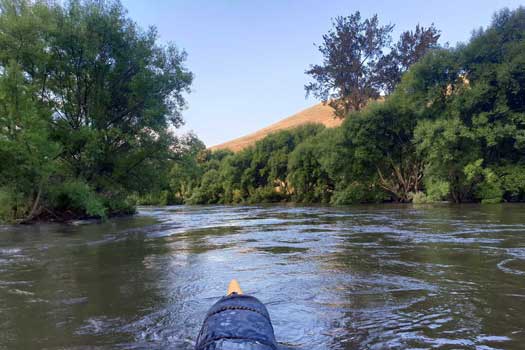
I had a poor night's sleep, likely due to it being a humid night and being close to the toilet block, though part of this could have been attributed to some pre-flight butterflies. Mid-morning I drove back to Gundagai and chilled out in the sun waiting for the mid-afternoon bus back to Tumut.
I arrived back at the camping ground at 4:20pm and it was close to 5pm by the time I got into my paddling gear and finished chatting to the neighbour. It was only after getting into the water when I realised how strong the current really was and I quickly realised I had an unbalanced load with the kayak cocking badly with the current. I had to paddle hard to avoid getting pulled into a sweeper that would have been a very bad start to the trip. With rudder assistance I continued on and had a fantastic fast trip down to my first campsite for the night. I roughly estimated that I made it 36.5 km in the 2.5 hrs worth of paddling, a rather impressive 14.6 kph in a plastic tub that has a top speed closer to 5 kph fully loaded on flat water.
I wanted to keep going, but knew I should camp well before the slightly more built up area of the lower section. With the high flows, all of the beaches were flooded and I was forced up onto the river banks. I set up in what looked like a fairly flat spot well clear of the raising waters.
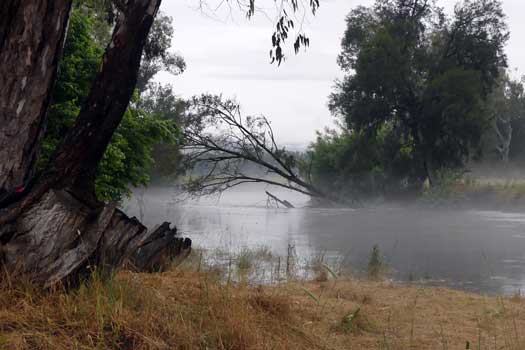
There was a really heavy downpour in the middle of the night and I quickly realised that my tent spot was too flat with the water pooling rather than flowing away. One half of my tent was completely flooded. Getting out and finding no nearby alternative spots and the worst of the rain seemingly over, I decided to just bunker down where I was and tried to avoid the puddles.
Wet and cold gear wasn't a pleasant first thing in the morning, but that was quickly forgotten as I got back out onto the water. The weather had cleared and I had blue skies and crisp mountain air. A layer of mist formed on the river and made for a surreal start to the day. The only negative was that the river had risen again overnight and was flowing with much more strength and the mist was limiting my field of vision. I tentatively stayed in the middle of the river and hoped I'd have enough time to react to any upcoming dangers.
It was a fast trip down and onto the Murrumbidgee, slowed only for the occasional walk for photos. The sky was getting darker as I neared Gundagai. Stopping to get the rest of my food supplies, the sky opened up and it poured down. I sheltered from the rain and lightning for nearly 10 minutes under the old bridge before deciding to carry on. I had an absolute drenching over the next hour or so. Thankfully the rains did stop and the skies cleared.
A few hours down the river I passed a couple of SoT that were heading down to Wagga Wagga over 5 leisurely days. We all were getting good current assist, so they weren't having to paddle much. I continued on and camped on a nice grassy bank near a rather noisy flock of Sulphur Crested Cockatoos. Listening to the birds chatter away to each other as they settle down for the night became one of the more memorable moments of the trip down.
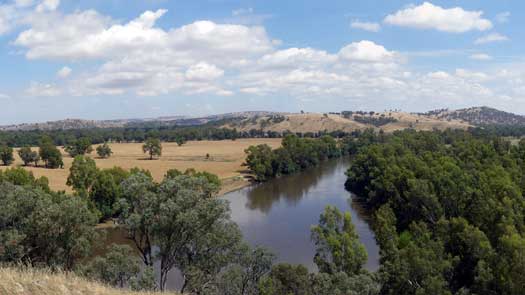
It was a rather uneventful day for the most part, paddling the wide and free flowing waters down towards Wagga Wagga. One heart splutter on the water where I took a shortcut only to hit a fallen tree that I had to bounce the kayak over. This wasn't bad by itself, but I was carrying my non-waterproof camera in my hands at the time and it could have easily gone into the river. The second was off the water as I climbed a small hill in my paddling gear to get a photo. Walking up with booties and shorts, I was rather careful to watch for snakes... until I got to the top. A small rocky outcrop slightly off the stock trail seemed to be a great photo place and I jumped over rather than walking through some long grass. To my surprise and slight horror, there was a fully mature brown snake sunning itself just on the other side about one foot away from where I landed. I instinctually jumped back as the snake started to coil back and it disappeared quickly into the loose rocks. I decided to use another vantage point to take my photo!
I stopped early about 20 km from Wagga Wagga to avoid getting stuck without a decent campsite for the night. It was a good decision in that it was a great site under the shade of a willow tree on short soft grass that made for a very comfortable site. Even though the water was relatively clear, my ceramic MSR quickly clogged up directly filtering the water.
A couple of kangaroos accompanied me today, though it was mostly farmland so sheep, cows and cockatoos were the main company for the day.
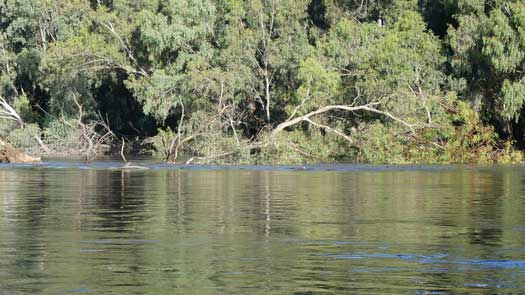
Pushed hard today with the goal of making my first 100 km day. The character of the river was similar with a few pelicans and spoonbills as well as a large number of straw neck ibises.
After a rather uneventful day, I was nearly hit by a falling tree as I was trying to find a camping site for the night. I heard a loud crack just after I passed under it and it fell into the river directly behind me. I missed getting crushed by just three seconds. This is not one of the hazards you expect when paddling down a river! I have heard a few trees fall while on the river in the past, but never one so close before.
About 400 m downstream I pulled up for the night and discovered that I managed to make my goal for the day, just. 100.6 km. I had just enough time to set up camp and cook dinner before the sun went down.
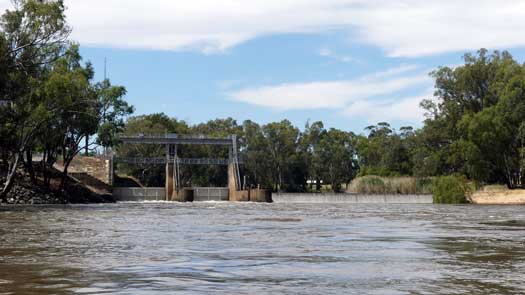
Pushed out another long day that included the portage for Berembed Weir. There is still a great flow with fairly abundant wildlife.
The weir was a bit of a hassle with the full yak, but at least you don't have to unload them. You are meant to get out before the buoy line that is about 150 m upstream of the weir and portage down to about 250 m downstream. Usually this means a 500 m portage that can take time. Definitely recommend a trolley rather than carrying your gear down by hand!
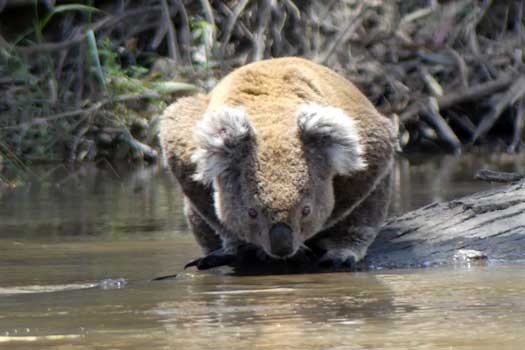
I had a two weir day today, passing both the Yanco and Gogeldrie Weirs. The river seemed to slow below Yanco and there were lake-like conditions above Gogeldrie.
The highlight of the day was a koala drinking from the river. It was on a fast narrow stretch of the river between a couple of fallen trees that pushed me out wide into the fast flowing outside bend. I was past it before I realised what it was, and even then I had to double take what I was seeing. With considerable effort I was able to paddle upstream (just) and I was able to do another flyby without disturbing it.
Koalas are meant to be able to get enough water from the gum leaves, but with the hot day today, (above 40°C), I'm sure they like to take a cold drink from the river to cool off. My approach is less dignified and involves pouring water all over myself and allowing the evaporation to cool me down. Once dry, repeat.
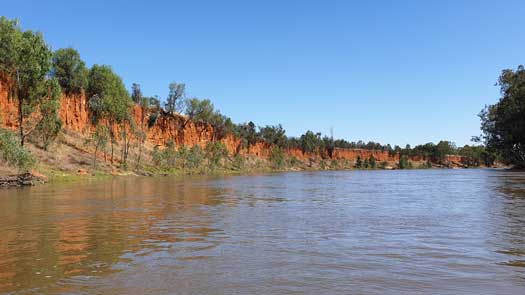
The weir portages seemed harder today, albeit that may have been partially due to the heat. Yanco seemed to be an extra-long portage and Gogeldrie was a construction site. The latter also didn't have a decent track back down to the river and I tried using the trolley on a narrow track with nearly catastrophic consequences. The dry grass had absolutely no traction, and both the kayak and I slid a couple of metres down a rocky bank. Thankfully the only damage were a couple of deep scratches to the kayak and a few minor scrapes to my legs. I could have easily broken something or landed on a snake in the long grass at the bottom of the bank.
Speaking of snakes, I saw another large coppery brown today as I was getting out near a bridge. While I saw it in time, I did spook it and it rushed directly towards me. It was easy to hop out of its way and watching it I realised why it did come directly at me; it's borrow was just under the spot I was standing.
I found a nice camp for the night, only to get multiple drive-bys from others trying to find a spot themselves. It was only later I discovered I was in one of the national park camping spots. With the memories of the Culgoa still fresh in my mind, I'm finding the river to be relatively busy, seeing close to 40 people today along the river.
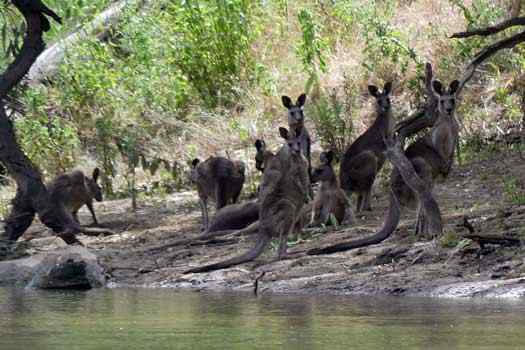
In the low 40s and windy today, 43.4°C to be precise. With the river zig-zagging across the valley, I was heading directly into the wind before the river turned where I would get some respite before turning back into the wind. It was picking up enough chop for me to take notice. After pushing hard down to Darlington Point I arrived to discover that I was too late for the store that closed at 12:30 and I was forced to continue on. I'm glad I have a good food supply on-board (4 weeks' worth), though I'm disappointed I couldn't get some fresh fruit.
While there was a small storm early afternoon, there was minimal respite from the heat. No koalas today, but there must have been over 200 kangaroos seen coming down to the water’s edge to drink today. One positive about the heat!
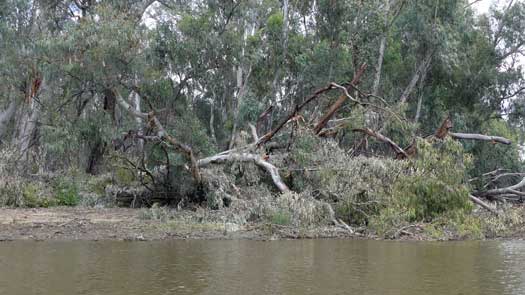
The windy night caused a lot of trees to fall all around me, albeit nothing too close. The damage was apparent as I got into the water and started paddling down. While there was usually only the odd tree down here and there, a couple of spots appeared to be more exposed and there were many fallen trees.
The landscape is slowly changing from river gum woodlands to more open farmland and scrub. There hardly seems to be any feed for the sheep that appear to be eating dirt along the river banks.
The river feels to be slowing, though I'm still managing to push out ~90 km days. I seem to be catching up on a higher flow that must be in front of me somewhere, but this doesn't seem to hasten the river.
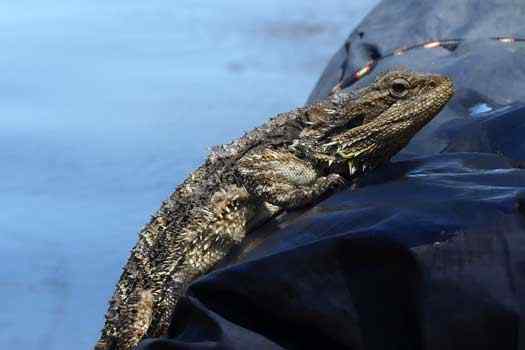
Two close encounters with animals today. I found a Bearded Dragon struggling in the cold waters and I gave it a ride to the bank, and while setting up camp I had my first true Echidna experience with a pair hunting insects in the deep leaf litter behind my tent. I noisily tried to get close to one and I spooked the poor little guy and he dived head first into a small hollow under a log. After a photo of a very spiky bum, I left him alone. It took nearly 30 minutes before he came out of defensive mode and continued his insect hunt. I fell asleep listening to their noisy rustling in the leaf litter.
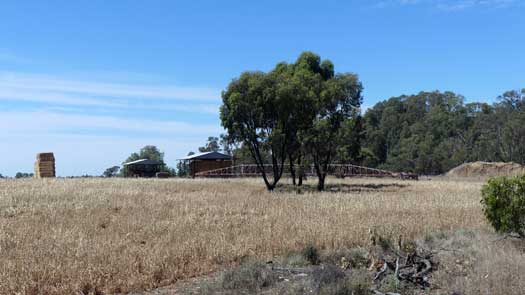
Slow start for the day after I spent close to 45 minutes despiking my gear from small sharp seed heads that seemed to have gotten everywhere. This seemed to set the tone for the day and I had a rather lethargic day on the river too.
I finally managed to restock up at Hay with some fresh fruit and supplies at Hay. That was close to 750 km since my last fresh food pickup aka start at Tumut.
The Hay Weir seems to be one of the biggest weirs on the system in terms of storage and it seemed to take a fairly long time to paddle down the still waters above it.
There has been a definite build up in the fisherman numbers of the last few days and I discovered why today. It was the start of the Murray River Cod season today. Everybody was fairly friendly though most were focused on the hunt.
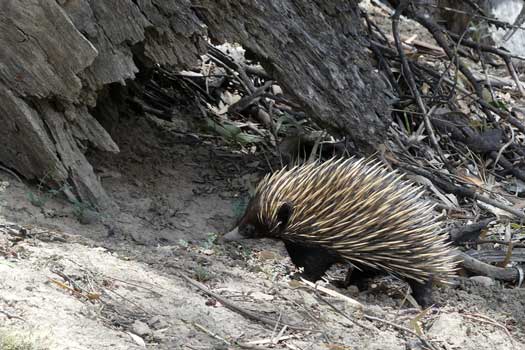
An unusual start to the day after noticing a sheep stuck in the water at the bottom of a rather tall muddy bank. I unsuccessfully tried to rescue it, though I managed to pass on a message to the farmer. Things were more arid along the riverbanks today with minimal wildlife other than the occasional sheep. As always, there were exceptions and I saw two separate Echidnas coming down to the river to drink. Having never really seen any in the wild over my time in Australia, three close encounters in about as many days is rather special.
I am having slower days on the waters as the weirs seem to be taking a toll on the current. Close to 30 km still water above Maude Weir. My goal of crossing the weir today really meant I had to push hard and it was late in the day when I finally got there. Heading downstream I only just managed to get a campsite away from the town / houses on dark which is never pleasant,
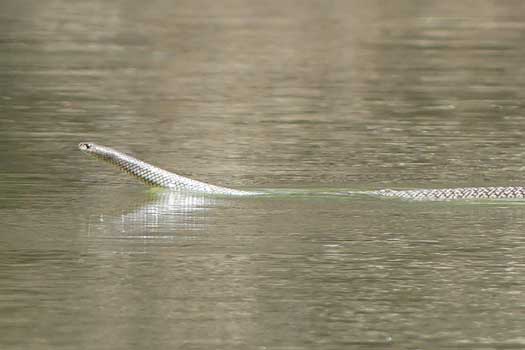
It was feeling more remote today and the current was definitely slowing. I wonder if that is due more to irrigation offtakes or the Redbank Weir downstream. Sheep were replaced with goats and signs of humans were less apart from a riverside camp like area that seemed deserted. Maybe it was the isolation playing with my mind, but that camp seemed to give off a really odd feel. That feeling was made worse with a complete lack of wildlife, including birds, around it other than a small brown snake swimming 5 km upstream. Though it was the rotting Kangaroo carcass strung up over the river in the worst possible way that really gave off a deliverance feel to it.
It was only later that I found out that this is an old way to "farm" maggots. As the carcass gets infested with maggots, these fall into the river. These in turn attract fish to the area. A rather smelly practice best done a long way from houses!
Glad to be past it, I keep going downstream until I get to the Lachlan River confluence, albeit that really doesn't describe it very well. The Lachlan River terminates in the Great Cumbungi Swamp and it is only rare big flood events that will overflow the swamp and in turn allow the river to run into the Murrumbidgee.
Today the confluence was really like a small drainage channel. I managed to paddle about 1 km up. There was a hint of a flow of maybe 10 ML/day that was most likely caused from seepage rather than the swamp overflowing from recent floods. As the small channel filled with trees and the landscape was very scrubby, it would be a very difficult finish to the Lachlan even if it was flowing all the way down. I decided to set up camp in a rather nice area opposite.
Today marked the first time on the river I was completely alone, no farmers, campers or fishermen seen.
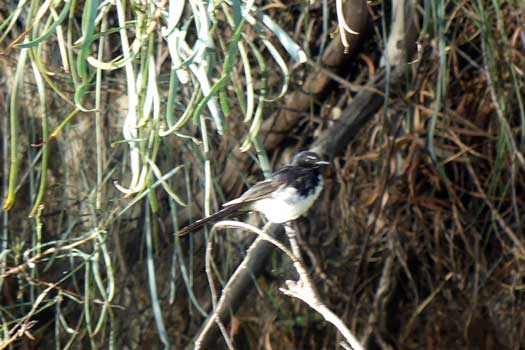
Lazy day in the sun watching life go on around me. Next to a hot solar shower, the highlight was watching a pair of tiny Willie Wagtails defending their turf against a Whistling Kite that was more intent in making lunch out of the Grey Teal ducklings. A few aggressive attacks by the wagtails and the kite quickly backed off. Having seen wagtails dive bomb crows and chase wedge tail eagles, the kite didn't have any chance!
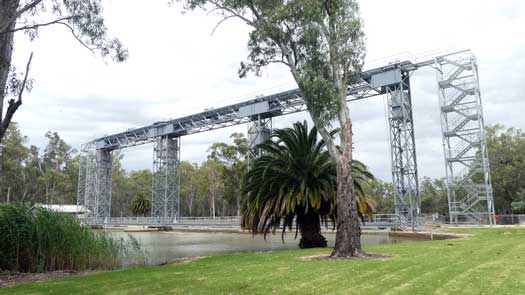
It was pleasant paddling down to Redbank Weir. Over the course of the morning the bank height became less and less until the river was lapping at the very tops of the banks. As the land was so flat it gave a strange optical illusion of the land falling away from the river on either side.
Taking out at the buoy line at Redbank Weir, I discovered I was actually locked in behind a 2 m fence. The gates are likely normally open but with covid all of the weirs on the river was closed to the public, though Redbank was the only one that had a parameter fence. While the first two gates were double padlocked, the third was open and I managed to portage through the backyard of the lock masters house that was empty at the time. There was a fisherman fishing at the weir itself, the first human seen in two and a half days.
Below the weir, the river had high slightly muddy banks with an increased amount of old fallen trees in the waters. For the most part there has been a path cut through that is wide enough for a tinny, likely done by fishermen or farmers.
A light rain fell all afternoon that helped to keep me cool and clean the air of dust and the smell of mud from the recent high flows.
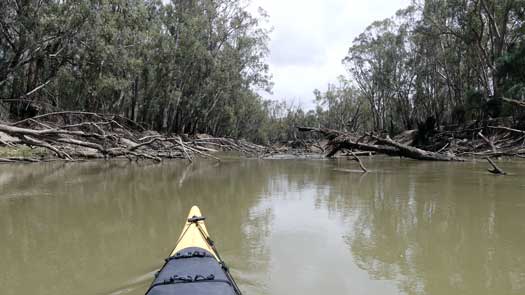
The river had similar tall banks as yesterday with minimal wildlife other than a few kangaroos though fully white Great Egrets are rather common. It has been generally easy to find your way through the downed trees without too much effort though I did hit a freshly fallen tree that spanned the entire river. I managed to bump up and hand push over at a section of the trunk where it was partially submerged.
I am definitely not timing my town visits well as I arrive in Balranald early on Sunday afternoon and everything other than the petrol station appears to be closed. Having about two weeks worth of food left this isn't really an issue and I paddle onwards. While the river was relatively clear around the town, downstream of the weir the river clogs up with fallen trees again.
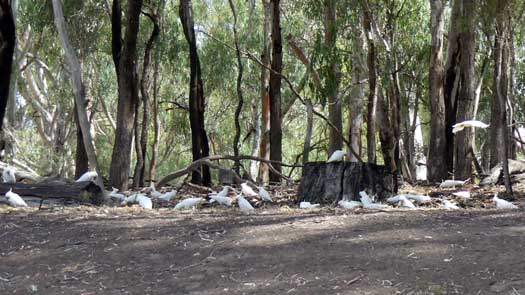
After seeing minimal wildlife all day, I was lucky enough to camp under another large flock of Sulphur crested Cockatoos. Maybe the fifth time on the trip, but this was the largest to date. They seem to be totally oblivious to me and they provide good entertainment for the final few hours of daylight as I set up camp and cook tea.
I'm slightly regretting going a bit slower today, and I wonder to myself if I'll make it to the Murray or not tomorrow.
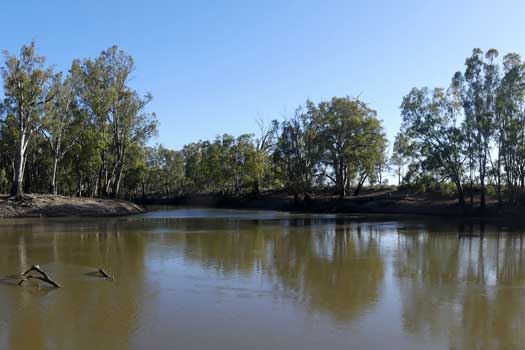
Having had a slightly cruisy day yesterday, I decided to push slightly harder today and aim for the Murray.
Overall it was a fairly quiet day with a couple emus being the main highlight. Though a few farmhouses were seen, the only person seen today was a fisherman at the mouth of the Murray that I reached at 6pm. I paddle back up the Murrumbidgee slightly for one last final camp on the river.
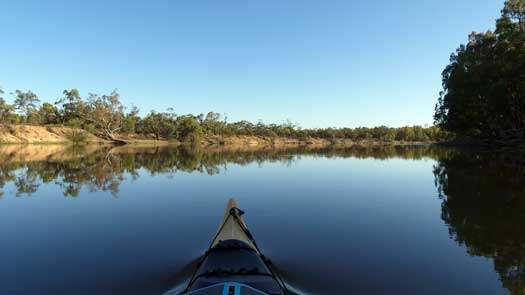
The Murray was wide and slow where the Murrumbidgee enters. For such a major Australian river, I find it a bit strange that I nearly have the river all to myself with just a couple of fishermen to be seen all day.
Being so wide it is not as great for wildlife spotting though I still see an emu, fox and a few kangaroos along the banks.
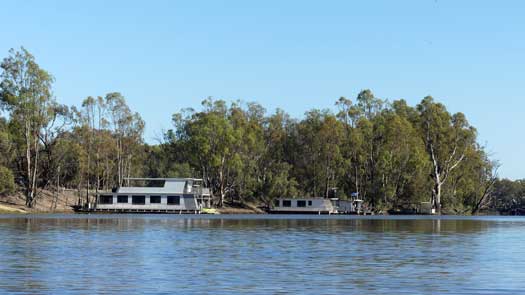
Final day is a fairly short one as I paddle down to Robinvale. I finished at the Robinvale Caravan Park. It was fairly empty with only a dozen or so campers. I give the kayak a complete wash down and head into town for some proper shampoo and soap so that I could have a shower and clean off for the bus ride tonight.
Though Robinvale was the bigger town and where I was storing my kayak, I had organised the bus from Euston in case of a border closure. It was a bit further than I was expecting as I walked over carrying two heavy dry bags in the hot afternoon sun. I stayed up waiting for the very early morning bus. Euston is a fairly quiet country town with a few food joints and a pub. By about 10pm everything was closed other than the laundry that seemed to have a steady flow of people all night long. At about 2:30am I had a visit from a wandering Echidna that provided some better entertainment than the laundromat. It popped out from around the pub and walked down the middle of the main street before checking around the shops near me. It then came directly over to me to say hello before heading back over to the pub. It was a remarkably cold night for early summer, it felt like it was below 10°C. Cold for a Queensland boy.
©2026 Alan Davison // Credit // Disclaimer